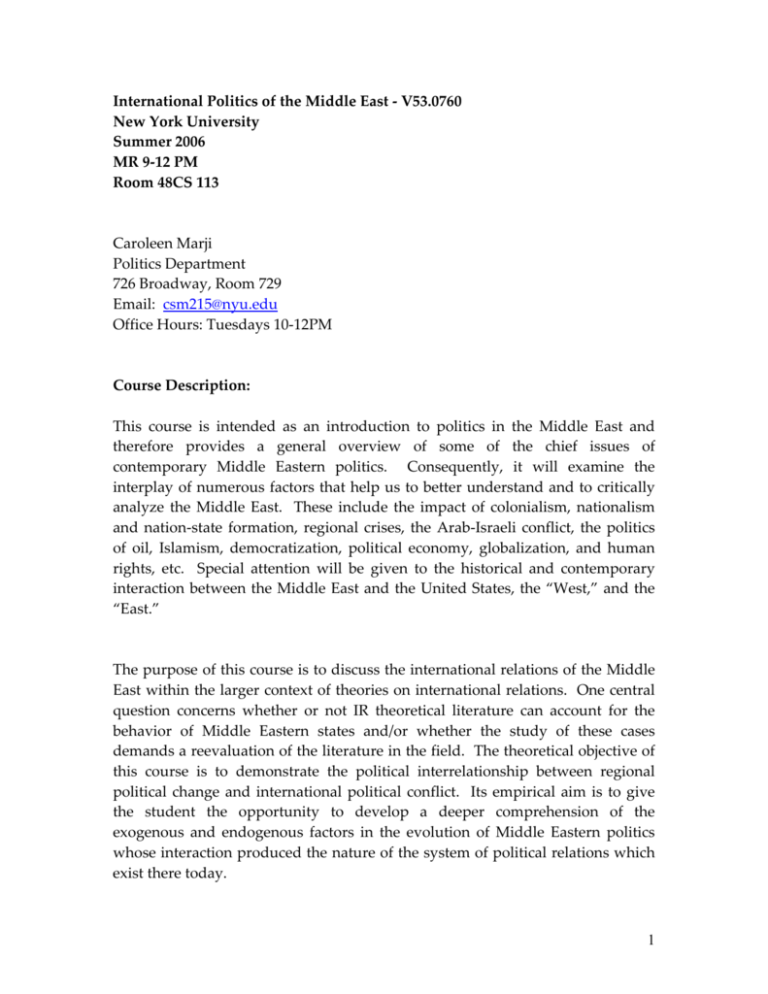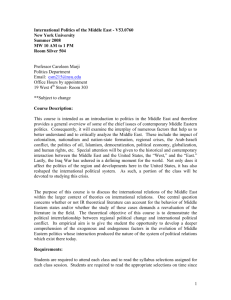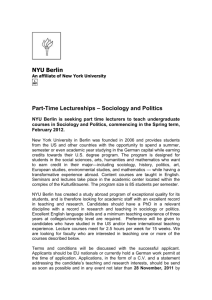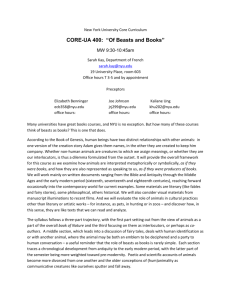International Politics of the Middle East - V53
advertisement

International Politics of the Middle East ‐ V53.0760 New York University Summer 2006 MR 9‐12 PM Room 48CS 113 Caroleen Marji Politics Department 726 Broadway, Room 729 Email: csm215@nyu.edu Office Hours: Tuesdays 10‐12PM Course Description: This course is intended as an introduction to politics in the Middle East and therefore provides a general overview of some of the chief issues of contemporary Middle Eastern politics. Consequently, it will examine the interplay of numerous factors that help us to better understand and to critically analyze the Middle East. These include the impact of colonialism, nationalism and nation‐state formation, regional crises, the Arab‐Israeli conflict, the politics of oil, Islamism, democratization, political economy, globalization, and human rights, etc. Special attention will be given to the historical and contemporary interaction between the Middle East and the United States, the “West,” and the “East.” The purpose of this course is to discuss the international relations of the Middle East within the larger context of theories on international relations. One central question concerns whether or not IR theoretical literature can account for the behavior of Middle Eastern states and/or whether the study of these cases demands a reevaluation of the literature in the field. The theoretical objective of this course is to demonstrate the political interrelationship between regional political change and international political conflict. Its empirical aim is to give the student the opportunity to develop a deeper comprehension of the exogenous and endogenous factors in the evolution of Middle Eastern politics whose interaction produced the nature of the system of political relations which exist there today. 1 Requirements: Students are required to attend each class and to read the syllabus selections assigned for each class session. Students are required to read the appropriate selections on time since the lectures will serve merely as outlines for the readings. Students are responsible for all readings on the syllabus, regardless of whether or not we cover all of the assigned readings. There may be changes to the syllabus during the semester and students are responsible for these changes. If you miss class, you are responsible for finding out what you missed, including handouts, announcements, etc. Make a friend in the class. Since the topics are generally controversial and multi‐faceted, students are encouraged to raise important issues in class and to make comments on the readings. I encourage students to engage in class discussions. There are no right or wrong positions on these issues and the classroom will be an arena of toleration for conflicting viewpoints. I will randomly call on students in class to answer questions about the readings. Students will be graded for attendance and participation. Class participation will be worth 30 % of your overall grade. Students will also be given one take home exam. This is worth 70% of your overall grade. The exam requires you to be able to assess and critique the various arguments presented by the authors. It is a critical response essay, not a research paper. Students are also responsible for reading news on the Middle East daily. At times, we will focus on issues in the news, depending on their relevance to our course readings. Although this class is taught during the summer session, the reading load and quality of the course will be equivalent to an academic year course. Students are expected to read all assignments before class and to be able to critique the various theoretical and ideological points of view. 2 Required Readings TEXTBOOKS: Please purchase the latest editions of the following texts and bring them to class when they are assigned. They are available at the NYU Bookstore. William Cleveland, A History of the Modern Middle East third edition (Westview Press: 2004) ISBN 0813340489 Raymond Hinnebusch, The International Politics of the Middle East (Manchester University Press: 2003) ISBN 0719053463 Noah Feldman, What We Owe Iraq: War and the Ethics of Nation Building (Princeton University Press: 2004). ISBN 0691121796 COURSE PACK: Students must also purchase a course pack for the course, composed of a selection of chapters from various texts. It will be available at New University Copy and Graphic‐ 11 Waverly Place. (212) 473‐7369 ONLINE ARTICLES: Please note that there will be selected articles online. Please follow the links to read the articles online. If the link is unavailable, look up the article by the full citation listed on the syllabus. For easier access to the links, view an online version of this syllabus at: http://www.nyu.edu/gsas/dept/politics/undergrad/undergrad_list.shtml#internat ional_politics Remote Access to NYU Libraries and Online Sources Students can gain access to NYU research engines through NYU Home. Log in to your account and follow the “research” links. If NYU Home is down, you can still access the library information sources from a computer system attached to NYU’s network, NYU‐NET. If you would like to access NYU libraries and some 3 of the online journals from a remote area (like home), you will need to configure your internet browser to permit full access from an external connection using NYU’s proxy server. See attachment below for detailed instructions on how to do this. It is easy. If you need assistance, contact ITS by phone at (212) 998‐3333 or by email at its.clientservices@nyu.edu Go to: http://www.nyu.edu/its/faq/connecting/proxy.html Middle East News Sources: Arabic News.com http://www.arabicnews.com Arab world news portal. Al‐Bab.com http://www.al‐bab.com/ provides background information on the Arab world and links to other sources. BBC Online Middle East coverage: http://news.bbc.co.uk/hi/english/world/middle_east/default.stm Christian Science Monitor, http://www.csmonitor.com/ Haaretz, http://www.haaretzdaily.com/ Jerusalem Post, http://www.jpost.com/ The Independent Middle East coverage http://news.independent.co.uk/world/middle_east/ Middle East International http://meionline.com/front.html online edition Middle East Report http://www.merip.org/mer/middle_east_report.html New York Times http://www.nyt.com 4 Course Schedule Introduction and Overview Understanding the Middle East in the Context of International Politics; Society and Culture; Islam: Culture, State and Society Monday May 15 • Hinnebusch, pp. 1‐13 • Cleveland, pp 1‐35 The Rise and Fall of the Ottoman Empire; Colonialism and Nationalism; The Struggle for Independence; Emergence of Nation‐State System; Political Ideologies; Turbulence, Instability and Regional Wars Thursday May 18 • Cleveland, pp. 37‐56, 119‐132, 149‐170 • Hinnebusch, pp. 14‐53 • Cleveland, pp. 171‐173, 175‐192, 193‐237, 273‐274, 301‐344 • Hinnebusch, pp. 54‐72 • Janice Gross Stein, “War and Security in the Middle East” Ch. 9, pp. 195‐214, in Fawcett et al. 2005 (course pack) The Arab‐Israeli Conflict; The Arab‐Palestinian Conflict; State and Society Transformations; Negotiations and the Peace Process Monday May 22 Thursday May 25 Thursday June 1 • Cleveland, pp. 239‐271, 345‐367, 473‐517 • Hinnebusch, pp. 154‐203 • Khalidi, Walid. “Why Did the Palestinians Leave,? Revisited,” Journal of Palestine Studies 34:2 (Winter 2005), pp. 42‐54 5 http://proquest.umi.com/pqdweb?vinst=PROD&fmt=6&startpage=‐ 1&clientid=9269&vname=PQD&RQT=309&did=819120141&scaling=FULL&vtype =PQD&rqt=309&TS=1124211741&clientId=9269 • Dennis Ross, The Missing Peace: The Inside Story of the Fight for Middle East Peace (New York: 2004), pp. 3‐45. (course pack) • Brown, Nathan, “Democracy, History, and the Contest over the Palestinian Curriculum” Prepared for Adam Institute (November 2001) • http://www.diak.org/Democracy%20in%20the%20Palestinian%20Curriculum. pdf • Milton Viorst, “The Road Map to Nowhere,” The Washington Quarterly 26:3 (Summer 2003), pp. 177‐190. http://lysander.ingentaselect.com/vl=11969907/cl=13/nw=1/fm=docpdf/rpsv/cw/m itpress/0163660x/v26n3/s12/p177 • “ICJ Advisory Opinion on Israeli Security Fence” The American Journal of International Law Vol. 98 No 2 (April 2004), pp. 361‐364 http://www.jstor.org/cgi‐ bin/jstor/printpage/00029300/sp040003/04x0102x/0.pdf?backcontext=page&dowh at=Acrobat&config=jstor&userID=807a8104@nyu.edu/01cc99333c005017b1752&0. pdf • Beverly Milton‐Edwards and Alastair Crooke, “Waving not Drowning: Strategic Dimensions of Ceasefires and Islamic Movements” Security Dialogue Vol. 35 No. 3 (September 2004) pp. 295‐310. http://ft.csa.com/htbin/ids65/process_pdfrequest.cgi?an=10%2e1177%2f096701060 4047528&db=sagepol%2dset%2dc&us=1105469830&ssparm=e41d10b4648a2d1739 df44f0a3ca9336&issn=0967‐0106 • Joel Midgal, “Myths and Models: The State‐in‐Society Approach and the Experience of Israel” pp. 3‐22; “Laying the Basis for a Strong State: the British and Zionists in Palestine” pp. 51‐79; “Changing Boundaries and Social Crisis: Israel and the 1967 War” pp. 149‐171; “The Odd Man Out; Arabs in Israel” pp.173‐194. (course pack) • Richard Ben Cramer, How Israel Lost: The Four Questions (New York: Simon and Schuster) 2004 pp. 1‐92, 139‐277 (course pack) Understanding State‐Building and Development in the Middle East: Modernization and Westernization; Middle East Context: Liberalization vs. Democratization; Islam and Democracy; The Islamist Dimension: 6 Organization and Mobilization; Problem of Persistent Authoritarianism and Legitimacy Monday June 5 Thursday June 8 Monday June 12 • Hinnebusch, pp. 73‐90, 204‐239 • Cleveland, pp. 369‐395, 397‐421 • Cleveland, pp. 275‐300, 423‐450 • Rex Brynen et. al, “Introduction: Theoretical Perspectives on Arab Liberalization and Democratization” pp. 3‐57 (course pack) • Augustus Richard Norton, “The Puzzle of Political Reform in the Middle East” Ch. 6, pp. 131‐148 in Fawcett, et al. (course pack) • Michael Hudson, “The Legitimacy Problem in Arab Politics” in Arab Politics (New Haven: Yale University Press) 1977, pp.1‐30 (course pack) • Lisa Wedeen, Ambiguities of Domination: Politics, Rhetoric, and Symbols in Contemporary Syria (2000) pp. 1‐66 (course pack) • Simon Murden, Islam, the Middle East and the New Global Hegemony (Lynne Reiner: 2002), pp.155‐183 (course pack) • Steven Fish, “Islam and Authoritarianism” World Politics 55 (October 2002), pp. 4‐37 http://muse.jhu.edu/journals/world_politics/v055/55.1fish.pdf The Politics of Oil: National and International Perspectives; The Rentier State and Economy; Oil Wealth and Development in the Middle East; Regional Stratification; The New World Order; Middle East Foreign Policy: Perspectives and Dimensions; Domestic, Regional and International Considerations Thursday June 15 • Cleveland, pp. 451‐472. • Hinnebusch, pp. 91‐153 • Giacomo Luciani, “Oil and Political Economy in the International Relations of the Middle East” Ch. 4, pp. 79‐102 in Fawcett et al. (course pack) 7 • Clement M. Henry, “The Clash of Globalizations in the Middle East” Ch. 5, pp. 105‐127 in Fawcett et al. (course pack) Middle East and the “West;” The Role of the US and Great Power Competition‐ Contemporary Issues Monday June 19 Thursday June 22 • Rosemary Hollis, “Europe in the Middle East” Ch. 14, pp. 307‐326 in Fawcett et al. (course pack) • Josh Pollack, “Saudi Arabia and the United States, 1931‐2002,” Middle East Review of International Affairs Vol. 6 No. 3 (September 2002) http://meria.idc.ac.il/journal/2002/issue3/jv6n3a7.html • Timothy Mitchell, “McJihad: Islam in the US Global Order,” Social Text 73 Vol. 20 No 4 (Winter 2002), pp. 1‐18. http://muse.jhu.edu/journals/social_text/v020/20.4mitchell.pdf • Feldman, all • Cleveland, pp. 519‐548 Take home exam: 5 pages double‐spaced Due in my mailbox no later than Friday 6/23 at 2 PM Late papers will be penalized. 8







